- Home
- Harlan Coben
The Boy from the Woods Page 2
The Boy from the Woods Read online
Page 2
“Reverse this around,” Rick Chad said. “If Simon Greene was poor and black and Aaron Corval was rich and white—”
“They’re both white. Don’t make this about race.”
“It’s always about race, but fine. If the guy in rags hit the rich white man in a suit, he wouldn’t have Hester Crimstein defending him. He’d be in jail right now.”
Hmm, Hester thought. She had to admit Rick Chad had a pretty good point there.
Prepster Host said, “Hester?”
Time was running out in the segment, so Hester threw up her hands and said, “If Rick Chad is arguing I’m a great attorney, who am I to disagree?”
That drew laughs.
“And that’s all the time we have for now. Coming up next, the latest controversy surrounding upstart presidential candidate Rusty Eggers. Is Rusty pragmatic or cruel? Is he really the most dangerous man in America? Stay with us.”
Hester pulled out the earpiece and unclipped the microphone. They were already headed to commercial break when she rose and crossed the room toward Matthew. He was so tall now, again like his father, and another pang struck hard.
Hester said, “Your mother…?”
“She’s fine,” Matthew said. “Everyone is okay.”
Hester couldn’t help it. She threw her arms around the probably embarrassed teen, wrapping him in a bear hug, though she was barely five two and he had almost a foot on her. More and more she saw the echoes of the father in the son. Matthew hadn’t looked much like David when he was little, when his father was still alive, but now he did—the posture, the walk, the hand wringing, the crinkle of the forehead—and it all broke her heart anew. It shouldn’t, of course. It should, in fact, offer some measure of comfort for Hester, seeing her dead son’s echo in his boy, like some small part of David survived the crash and still lives on. But instead, these ghostly glimmers rip at her, tear the wounds wide open, even after all these years, and Hester wondered whether the pain was worth it, whether it was better to feel this pain than feel nothing. The question was a rhetorical one, of course. She had no choice and would want it no other way—feeling nothing or someday being “over it” would be the worst betrayal of all.
So she held her grandson and squeezed her eyes shut. The teen patted her back, almost as though he were humoring her.
“Nana?”
That was what he called her. Nana. “You’re really okay?”
“I’m fine.”
Matthew’s skin was browner than his father’s. His mother, Laila, was black, which made Matthew black too or a person of color or biracial or whatever. Age was no excuse, but Hester, who was in her seventies but told everyone she stopped counting at sixty-nine—go ahead, make a joke, she’d heard them all—found it hard to keep track of the evolving terminology.
“Where’s your mother?” Hester asked.
“At work, I guess.”
“What’s the matter?” Hester asked.
“There’s this girl in school,” Matthew said.
“What about her?”
“She’s missing, Nana. I want you to help.”
CHAPTER
THREE
Her name is Naomi Pine,” Matthew said.
They were in the backseat of Hester’s Cadillac Escalade. Matthew had taken the hour-long train ride in from Westville, changing at the Frank Lautenberg Station in Secaucus, but Hester figured that it would be easier and smarter to drive him back to Westville. She hadn’t been out to visit in a month, much too long, and so she could both help her distraught grandson with his problem and spend some time with him and his mom, killing the allegorical two birds with one stone, which was a really violent and weird image when you stopped and thought about it. You throw a stone and kill two birds—and this is a good thing?
Look at me, throwing a stone at a beautiful bird. Why? Why would a person do such a thing? I don’t know. I guess I’m a psychopath, and whoa—I hit two birds somehow! Yay! Two dead birds!
“Nana?”
“This Naomi,” Hester said, pushing the silly inner rant away. “She’s your friend?”
Matthew shrugged as only a teenager can. “I’ve known her since we were, like, six.”
Not a direct answer, but she’d allow it.
“How long has she been missing?”
“For, like, a week.”
Like, six. Like, a week. It drove Hester crazy—the “likes,” the “you-knows”—but now was hardly the time.
“Did you try to call her?”
“I don’t know her phone number.”
“Are the police looking for her?”
Teenage shrug.
“Did you talk to her parents?”
“She lives with her dad.”
“Did you speak to her dad?”
He made a face as though that was the most ridiculous thing imaginable.
“So how do you know she’s not sick? Or away on vacation or something?”
No reply.
“What makes you think she’s missing?”
Matthew just stared out the window. Tim, Hester’s longtime driver, veered the Escalade off Route 17 and into the heart of Westville, New Jersey, less than thirty miles from Manhattan. The Ramapo Mountains, which are actually part of the Appalachians in every way, rose into view. The memories, as they have a habit of doing, swarmed in and stung.
Someone once told Hester that memories hurt, the good ones most of all. As she got older, Hester realized just how true that was.
Hester and her late husband, Ira—gone now seven years—had raised three boys in the “mountain suburb” (that’s what they called it) of Westville, New Jersey. Their oldest son, Jeffrey, was now a DDS in Los Angeles and on his fourth wife, a real estate agent named Sandy. Sandy was the first of Jeffrey’s wives who hadn’t been an inappropriately younger dental hygienist in his office. Progress, Hester hoped. Their middle son, Eric, like his father before him, worked in the nebulous world of finance—Hester could never understand what either man, her husband or son, actually did, something with moving piles of money from A to B to facilitate C. Eric and his wife, Stacey, had three boys, aged two years apart, just as Hester and Ira had done. The family had recently moved down to Raleigh, North Carolina, which seemed all the rage nowadays.
Their youngest son—and truth be told, Hester’s favorite—had been Matthew’s father, David.
Hester asked Matthew, “What time will your mom be home?”
His mother, Laila, like grandmother Hester, worked at a major law firm, though she specialized in family law. She’d started her career as Hester’s associate during summers while attending Columbia Law School. That was how Laila had first met Hester’s son.
Laila and David had fallen in love pretty much right away. They’d gotten married. They had a son named Matthew.
“I don’t know,” Matthew said. “Want me to text her?”
“Sure.”
“Nana?”
“What, hon?”
“Don’t tell Mom about this.”
“About…?”
“About Naomi.”
“Why not?”
“Just don’t, okay?”
“Okay.”
“Promise?”
“Stop it,” Hester said with a little snap that he needed her to say this. Then, more gently: “I promise. Of course, I promise.”
Matthew fiddled with his phone as Tim made the familiar right turn, then left, then two more rights. They were on a storybook cul-de-sac called Downing Lane now. Up ahead was the grand log-cabin-style home Hester and Ira had built forty-two years ago. It was the home where she and Ira raised Jeffrey, Eric, and David, and then, fifteen years ago, with their sons grown, Hester and Ira decided that it was time to leave Westville. They’d loved their home in the foothills of the Ramapo Mountains, Ira more than Hester because, God help her, Ira was an outdoorsman who loved hiking and fishing and all those things that men named Ira Crimstein were not supposed to like. But it had been their time to move on. Towns like Westvi
lle are meant for raising children. You get married, you move out from the city, you have a few babies, you go to their soccer games and dance recitals, you get overly emotional at their graduations and commencements, they go to college, they visit and sleep in late, and then they stop doing even that and you’re alone and really, like any life cycle, it’s time to put this behind you, sell the house to another young couple who move out from the city to have a few babies, and start anew.
There was nothing for you in towns like Westville when you got older—and there was nothing wrong with that.
So Hester and Ira did indeed move on. They found an apartment on Riverside Drive on the Upper West Side of Manhattan facing the Hudson River. They loved it. For almost thirty years they had commuted on that same train Matthew had taken today, changing in Hoboken back in those days, and now, in their advancing years, to be able to wake up and walk or quickly subway to work was heaven.
Hester and Ira relished living in New York City.
As for the old mountain home on Downing Lane, they ended up selling it to their son David and his wonderful wife, Laila, who’d just had their first child—Matthew. Hester thought that it might be odd for David, living in the same house he’d grown up in, but he claimed that it would be the perfect place to start and raise a family of his own. He and Laila did an entire renovation, putting their own stamp on the house, making the interior almost unrecognizable to Hester and Ira during their visits out here.
Matthew was still staring down at his phone. She touched his knee. He looked up.
“Did you do something?” she asked.
“What?”
“With Naomi.”
He shook his head. “I didn’t do anything. That’s the problem.”
Tim pulled to a stop in her old driveway at her old house. The memories didn’t bother swarming anymore—they just full-on assaulted. Tim put the car in park and turned to look at her. Tim had been with her for nearly two decades, since he’d first immigrated from the Balkans. So he knew. He met her eye. She gave him the slightest of nods to let him know that she’d be okay.
Matthew had already thanked Tim and gotten out. Hester reached for the door handle, but Tim stopped her with a throat clear. Hester rolled her eyes and waited while Tim, a big slab of a man, rolled his way out of his seat into a standing position and opened the door for her. It was a completely unnecessary gesture, but Tim felt insulted when Hester opened the door on her own, and really, she fought enough battles every day, thank you very much.
“Not sure how long we’ll be,” she said to Tim.
His accent remained thick. “I’ll be here.”
Matthew had opened the front door of the house and left it ajar. Hester shared one more look with Tim before walking up the cobblestone path—the same one she and Ira installed themselves over a weekend thirty-three years ago—and heading inside the home. She closed the door behind her.
“Matthew?”
“In the kitchen.”
She moved to the back of the house. The door of the huge Sub-Zero refrigerator—that hadn’t been there in her day—was open, and again she flashed back to Matthew’s father at that age, to all her boys during their high school years: Jeffrey, Eric, and David, always with their heads in the refrigerator. There were never enough groceries in the house. They ate like trash compactors with feet. If she bought food, it was gone the next day.
“You hungry, Nana?”
“No, I’m good.”
“You sure?”
“I’m sure. Tell me what’s going on, Matthew.”
His head came into view. “Do you mind if I just make a little snack first?”
“I’ll take you out to dinner, if you want.”
“I got too much homework.”
“Suit yourself.”
Hester wandered into the den with the TV. She smelled burnt wood. Someone had recently used the fireplace. That was strange. Or maybe it wasn’t. She checked out the coffee table.
It was neat. Too neat, she thought.
Magazines stacked. Coasters stacked. Everything in its proper place.
Hester frowned.
With Matthew busy eating his sandwich, she tiptoed up to the second level. This was none of her business, of course. David had been dead for ten years. Laila deserved to be happy. Hester meant no harm, but she also couldn’t help herself.
She entered the master bedroom.
David, she knew, had slept on the far side of the bed, Laila by the door. The king-sized bed was made. Immaculately.
Too neat, she thought again.
A lump formed in her throat. She crossed the room and checked the bathroom. Immaculate too. Still not able to stop herself, she checked the pillow on David’s side.
David’s side? Your son has been gone for ten years, Hester. Leave it be.
It took a few seconds, but eventually she located a light-brown hair on the pillow.
A long light-brown hair.
Leave it be, Hester.
The bedroom window looked onto the backyard and the mountain beyond. The lawn blurred into the slope and then faded away into a few trees, then more trees, then a full-blown thick forest. Her boys had played there, of course. Ira had helped them build a tree house and forts and Lord knew what. They made sticks into guns and knives. They played hide-and-seek.
One day, when David was six years old and supposedly alone, Hester had overheard him talking to someone in those woods. When she asked him about it, little David tensed up and said, “I was just playing with me.”
“But I heard you talking to someone.”
“Oh,” her young son had said, “that was my invisible friend.”
It had been, as far as Hester knew, the only lie David had ever told her.
From downstairs, Hester heard the front door open.
Matthew’s voice: “Hey, Mom.”
“Where’s your grandmother?”
“Right here,” he said. “Uh, Nana?”
“Coming!”
Feeling both panicked and like a total idiot, Hester quickly slipped out of the bedroom and into the hallway bathroom. She closed the door, flushed the toilet, and even ran the water to make it look good. Then she headed toward the stairs. Laila was at the bottom, staring up at her.
“Hey,” Hester said.
“Hey.”
Laila was gorgeous. There was no way around it. She dazzled in the fitted gray business suit that hugged where it should, which in her case was everywhere. Her blouse was a vibrant white, especially against the darkness of her skin.
“You okay?” Laila asked.
“Oh, sure.”
Hester made it the rest of the way down the stairs. The two women hugged briefly.
“So what brings you out, Hester?”
Matthew came into the room. “Nana was helping me with a school report.”
“Really? On what?”
“The law,” he said.
Laila made a face. “And you couldn’t ask me?”
“And, uh, also being on TV,” Matthew added clumsily. Not a good liar, Hester thought. Again, like his dad. “Uh, like, no offense, Mom, being a famous lawyer.”
“That a fact?”
Laila turned to Hester. Hester shrugged.
“Okay then,” Laila said.
Hester flashed back to David’s funeral. Laila had stood there, holding little Matthew’s hand. Her eyes were dry. She didn’t cry. Not once that day. Not once in front of Hester or anyone else. Later that night, Hester and Ira took Matthew out for a hamburger at ABG’s in Allendale. Hester had left early and come back. She walked into the backyard, into the opening in the woods where she’d seen David disappear countless times to go see Wilde, and even from there, even at that distance with the night wind howling, she could hear the guttural cries of Laila alone in her bedroom. The cries were so raw, so ripping, so pained that Hester thought that maybe Laila would break in a way no one could ever fix.
Laila had not remarried. If there were other men in the past ten yea
rs—and there had to have been many, many offers—she had not told Hester about them.
But now, there was this too-neat house and this long brown hair.
Leave it be, Hester.
Without warning, Hester reached out with both arms and pulled Laila in close.
Surprised, Laila said, “Hester?”
Leave it be.
“I love you,” Hester whispered.
“I love you too.”
Hester squeezed her eyes shut. She couldn’t keep tears back.
“Are you okay?” Laila asked.
Hester gathered herself, took a step back, smoothed her clothes. “I’m fine.” She reached into her purse and grabbed out a tissue. “I just get…”
Laila nodded. Her voice was soft. “I know.”
From over his mother’s shoulder, Hester spotted Matthew shaking his head, reminding her of what she’d promised.
Hester said, “I better go.”
She kissed them both and hurried out the door.
Tim was waiting for her with the door open. He wore a black suit and chauffeur cap to work every day, whatever the weather or season, even though Hester told him he didn’t have to and neither the suit nor the cap ever seemed to fit him right. It could be his bulky frame. It could be that he carried a gun.
As she slid into the backseat, Hester turned for one last look at the house. Matthew stood in the doorway. He looked at her. It hit her yet again:
Her grandson was asking for her help.
He had never done that before. He wasn’t telling her the whole story. Not yet. But as she wallowed in her own pity, in her own misery, in this awful hole in her own life, she reminded herself that it was a much bigger and more awful hole for Matthew, growing up without a father, growing up, especially, without that father, without that good and kind man, who had been the best of Hester and even more Ira—Ira, who died of a heart attack, she was convinced, because he could never get over the heartbreak of losing his son in that crash.
Tim slid back into the driver’s seat.
“You heard what Matthew said?” she asked.
“Yes.”
“What do you think?”

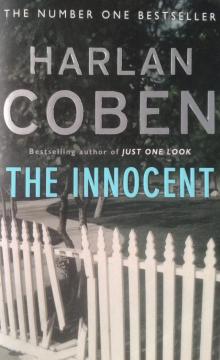 The Innocent
The Innocent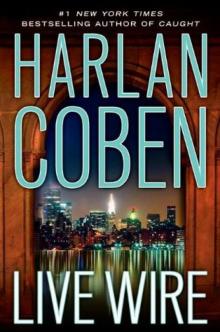 Live Wire
Live Wire Play Dead
Play Dead Drop Shot
Drop Shot Seconds Away
Seconds Away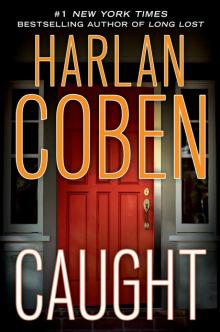 Caught
Caught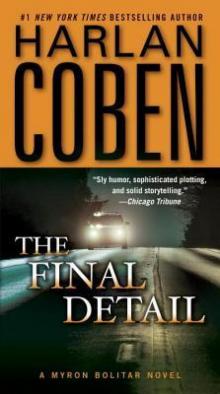 The Final Detail
The Final Detail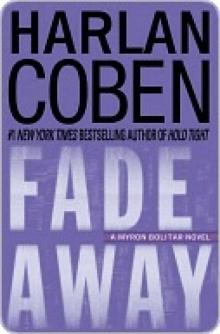 Fade Away
Fade Away Home
Home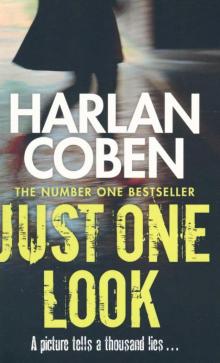 Just One Look
Just One Look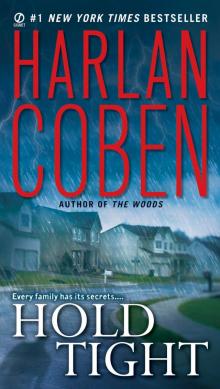 Hold Tight
Hold Tight Fool Me Once
Fool Me Once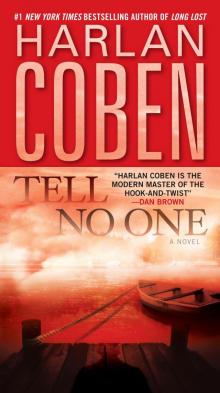 Tell No One
Tell No One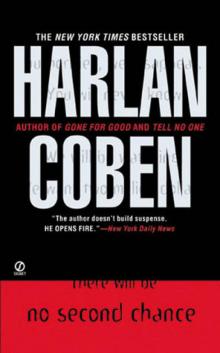 No Second Chance
No Second Chance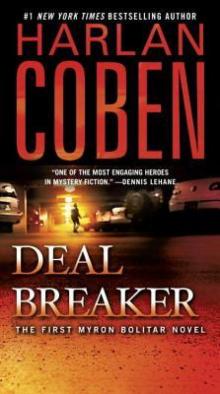 Deal Breaker
Deal Breaker Long Lost
Long Lost One False Move
One False Move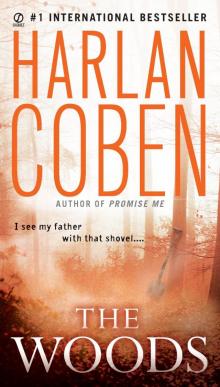 The Woods
The Woods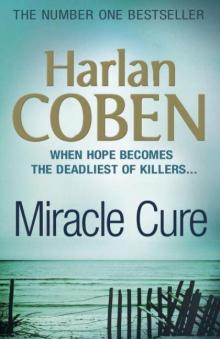 Miracle Cure
Miracle Cure Found
Found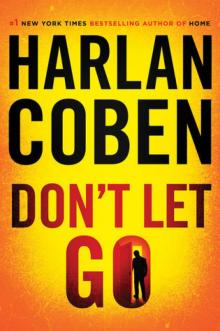 Don't Let Go
Don't Let Go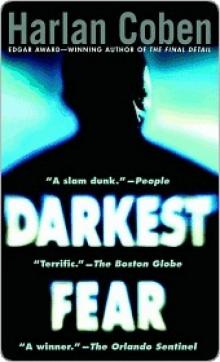 Darkest Fear
Darkest Fear The Stranger
The Stranger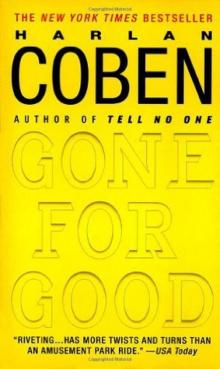 Gone for Good
Gone for Good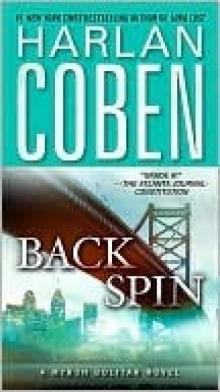 Back Spin
Back Spin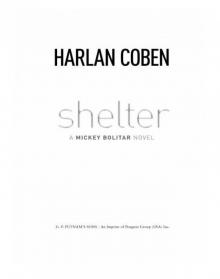 Shelter
Shelter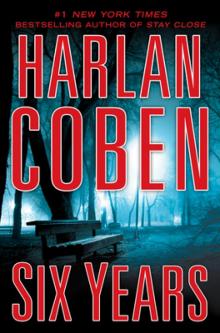 Six Years
Six Years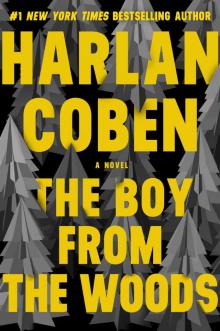 The Boy from the Woods
The Boy from the Woods Missing You
Missing You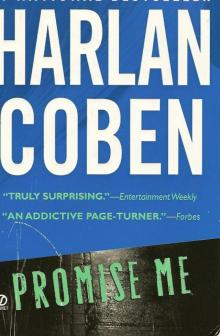 Promise Me mb-8
Promise Me mb-8 The Final Detail: A Myron Bolitar Novel
The Final Detail: A Myron Bolitar Novel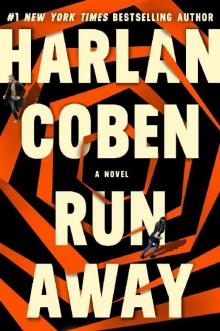 Run Away
Run Away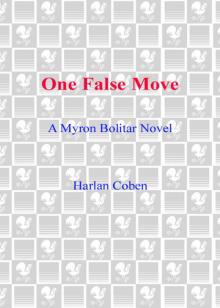 One False Move: A Myron Bolitar Novel
One False Move: A Myron Bolitar Novel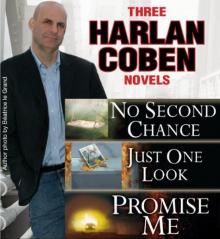 Three Harlan Coben Novels
Three Harlan Coben Novels the Woods (2007)
the Woods (2007) Tell No One (2001)
Tell No One (2001) the Innocent (2005)
the Innocent (2005)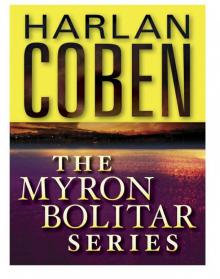 The Myron Bolitar Series 7-Book Bundle
The Myron Bolitar Series 7-Book Bundle Gone for Good (2002)
Gone for Good (2002) Caught (2010)
Caught (2010) Hold Tight (2008)
Hold Tight (2008)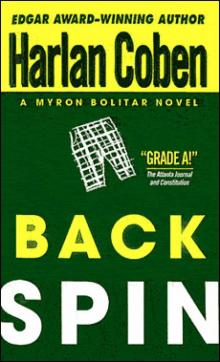 04 - Back Spin
04 - Back Spin Miracle Cure (1991)
Miracle Cure (1991) Harlan Coben 3 Novel Collection
Harlan Coben 3 Novel Collection Just One Look (2004)
Just One Look (2004)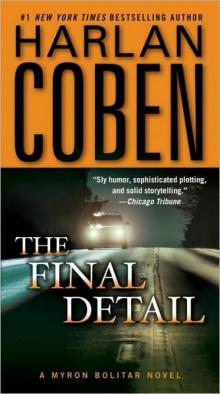 The Final Detail mb-6
The Final Detail mb-6 Play Dead (2010)
Play Dead (2010)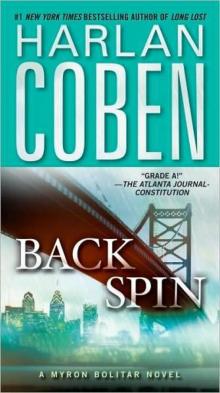 Back Spin mb-4
Back Spin mb-4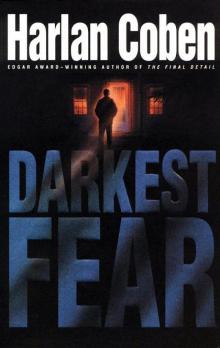 Darkest Fear mb-7
Darkest Fear mb-7